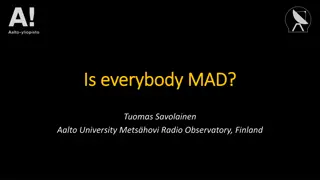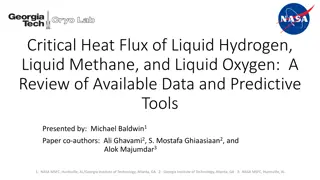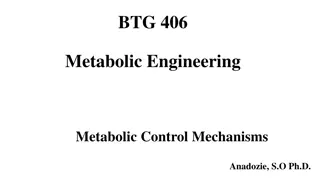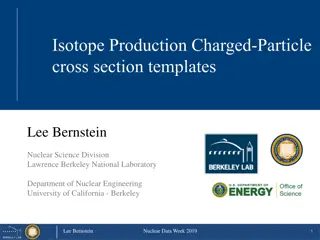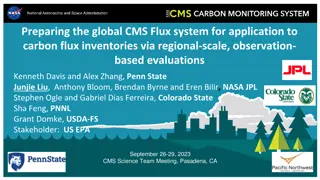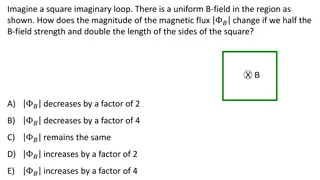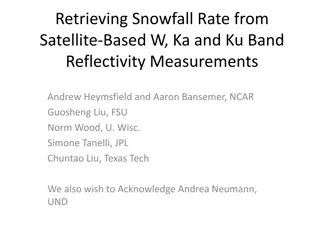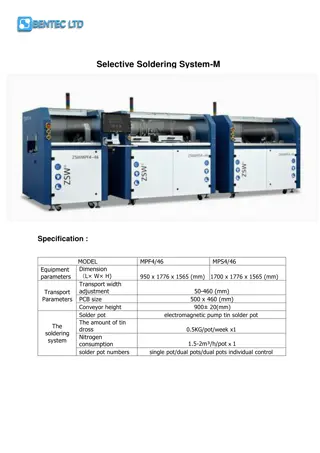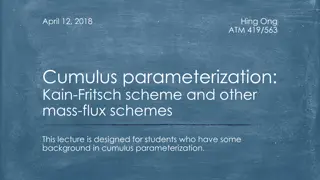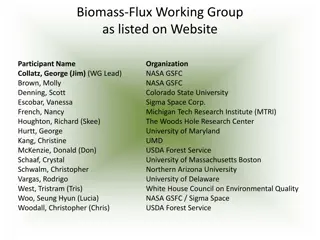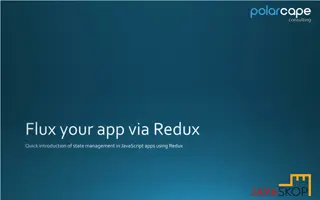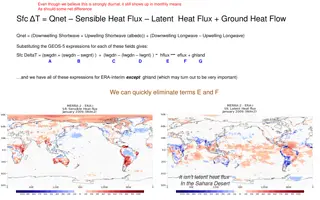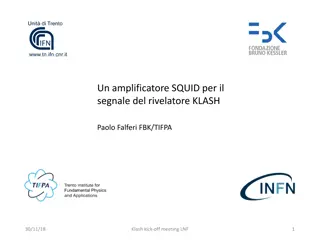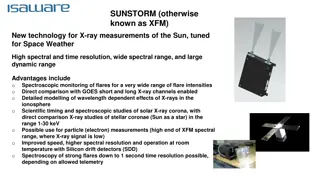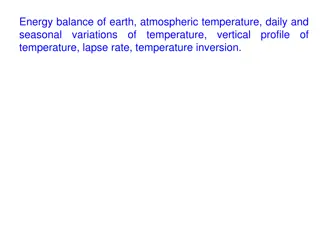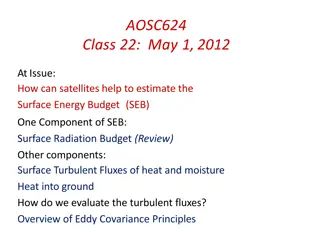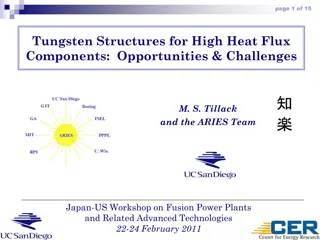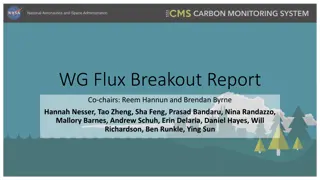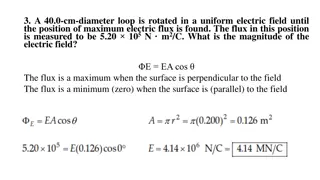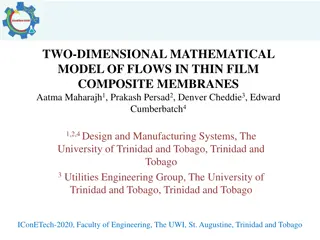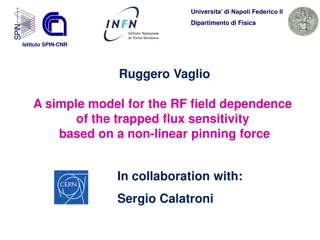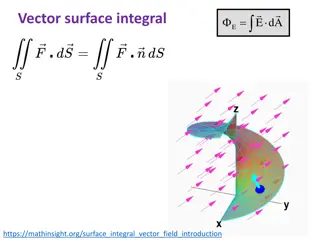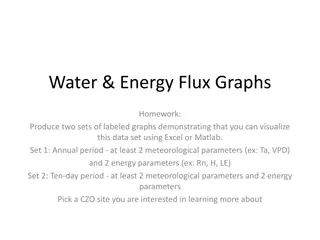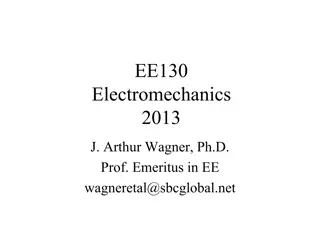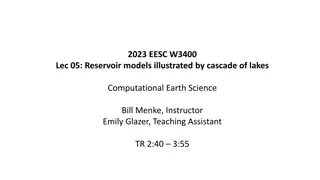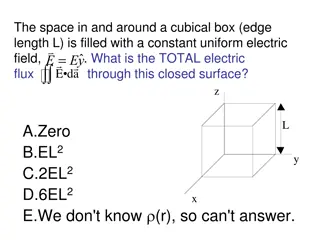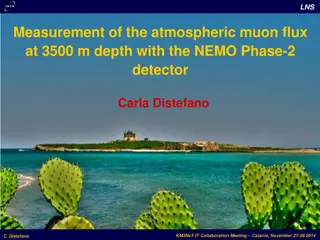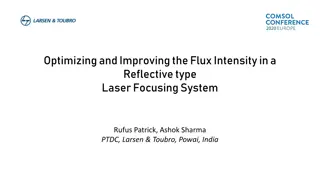AGN Jet Production Efficiency: Insights from Spin and Magnetic Flux
A fundamental question in astrophysics is how efficiently active galactic nuclei (AGN) produce jets. Black hole spin and magnetic flux play crucial roles in determining the jet production efficiency. High-spin values and large magnetic flux threading are essential for generating high-efficiency jets
2 views • 22 slides
Review of Critical Heat Flux in Liquid Hydrogen, Methane, and Oxygen
This review paper presents data and predictive tools on the critical heat flux (CHF) of liquid hydrogen, methane, and oxygen. It covers the motivation for CHF modeling, background on pool and flow boiling curves, availability of CHF data for different liquids, and applications in space propulsion sy
1 views • 15 slides
Metabolic Control Mechanisms in Cellular Regulation
Metabolic control mechanisms play a crucial role in maintaining homeostasis within cells by regulating metabolic pathways. This involves finely adjusting the output of pathways in response to external signals, ensuring the proper flux of metabolites to meet cellular needs. Pacemaker enzymes, such as
2 views • 17 slides
Secondary Clarifiers in Wastewater Treatment
Secondary clarifiers play a crucial role in wastewater treatment processes by producing clarified effluent and concentrating biological solids. This involves settling tanks following trickling filters and suspended growth processes, each with specific objectives. Column and continuous flow analyses
0 views • 10 slides
Isotope Production Charged Particle Cross Section Techniques
The process of measuring angle-integrated charged-particle cross sections using the stacked target technique is discussed. The method involves the use of monitor foils, degraders, and a beam foil of interest to determine energy and flux. Uncertainties in the measurements and the correction for flux
3 views • 3 slides
Application of CMS-Flux System for Carbon Flux Inventories Evaluation
Preparation for the global CMS Flux system integration with US forest and agricultural carbon inventory data to quantify uncertainties and enhance inventory-relevant flux estimates. The project aims to evaluate the utility of CMS-Flux-NA system for top-down assessment of US agricultural and forest C
3 views • 21 slides
Magnetic Flux and Induced Current in Loops
Explore concepts related to magnetic flux and induced current in loops through visual scenarios involving uniform magnetic fields, loop movements, and changes in magnetic flux. Test your understanding with multiple-choice questions on induced EMF, loop bending, and maximizing magnetic flux. Enhance
1 views • 54 slides
Retrieving Snowfall Rate from Satellite-Based W, Ka, and Ku Band Reflectivity Measurements
This study discusses methods for retrieving snowfall rate from satellite-based reflectivity measurements, specifically focusing on developing S-Z relationships through collocations and conservation of mass flux. It highlights the importance of identifying differences between retrieval products and t
0 views • 13 slides
Advanced Selective Soldering System with Flux Spray and Preheating Modules
The Selective Soldering System-M offers precise soldering capabilities with features like individual pot control, flux spray module for reduced contamination, and preheating module for lead-free and multi-layer boards. It minimizes flux consumption and ionic contamination while ensuring high positio
0 views • 6 slides
Cumulus Parameterization and Mass-Flux Schemes in Atmospheric Science
Explore the significance of mass-flux schemes in cumulus parameterization, their interaction with grid-scale microphysics, and the key elements and assumptions involved. Learn about the objectives, components, and limitations of classical cumulus schemes for atmospheric modeling. Gain insights into
1 views • 23 slides
ESA Cross-Support Activities Report October 2021
October 2021 witnessed various cross-support activities by ESA, including data exchange with JPL for flux calculation comparison, ESA-JAXA cross-support validation, and investigations into flux comparison issues. The report also highlights inconsistencies found in JAXA OBS files and provides updates
0 views • 7 slides
Biomass-Flux Working Group Overview
The Biomass-Flux Working Group, a collaboration involving various organizations like NASA and universities, aims to integrate land-atmosphere carbon fluxes and biomass changes to enhance estimations and understanding. By identifying overlapping projects, encouraging cross-comparisons, and reconcilin
0 views • 10 slides
SPC.CS Coil Design and Analyses: Requirements, Assumptions, and Methodology
This document discusses the design and analysis of SPC.CS coil, focusing on maximizing magnetic flux, survival under fatigue conditions, and materials used for different field layers. It covers requirements, assumptions, and the methodology for uniform current density solenoid design. The study aims
0 views • 15 slides
Magnetic Flux and Induction Principles
Exploring the concepts of magnetic flux and electromagnetic induction through visual aids and explanations. Topics include the generation of current in coils, Faraday's law, Lentz's law, and the behavior of induced current with changing flux.
1 views • 36 slides
Introduction to State Management with Flux and Redux in JavaScript Apps
Explore the concepts of Flux and Redux for efficient state management in JavaScript applications, understanding their architecture, key components, and benefits in simplifying data flow. Dive into the unidirectional data flow pattern of Flux and the inspired improvements in Redux, alongside the comp
1 views • 13 slides
Analysis of Surface Temperature and Heat Flux Relationships
Exploring the interplay between surface temperature, sensible heat flux, latent heat flux, and ground heat flow, utilizing data from GEOS-5 and ERA-interim models to understand the impact of different heat flux components on surface temperature variations in diurnal cycles and monthly means. Compari
2 views • 8 slides
Superconducting Quantum Interference Device (SQUID)
The Superconducting Quantum Interference Device (SQUID) is a crucial component for detecting signals in devices like the KLASH detector. By combining Flux Quantization and Josephson Tunneling, the SQUID operates based on key principles such as the Josephson Equations and the Flux Quantum. Through ca
1 views • 23 slides
SUNSTORM: Advanced X-ray Technology for Solar Measurements
SUNSTORM, also known as XFM, is a cutting-edge technology designed specifically for measuring X-rays from the Sun, tailored for Space Weather monitoring. It offers high spectral and time resolution, a wide spectral range, and a large dynamic range, making it ideal for various scientific studies rela
0 views • 4 slides
Earth's Energy Balance and Temperature Variations
Earth's energy balance is crucial for maintaining atmospheric temperature and regulating daily and seasonal temperature changes. The net radiation, consisting of incoming shortwave and outgoing longwave radiation, plays a key role in this balance. Components such as sensible heat flux, latent heat o
0 views • 18 slides
Satellite Applications in Estimating Earth's Surface Energy Budget
Satellites play a crucial role in estimating the Surface Energy Budget (SEB) by providing data on various components such as Surface Radiation Budget and Surface Turbulent Fluxes. The SEB includes factors like net radiation flux, sensible and latent heat fluxes, and subsurface heat transfer. Satelli
0 views • 38 slides
Tungsten Structures for High Heat Flux Components: Opportunities & Challenges
Tungsten has a long history in fusion research, with applications in high-heat-flux components. He-cooled W structures offer performance advantages, such as high heat flux capability and good safety characteristics. Various design configurations and cooling schemes have been developed, with a focus
0 views • 15 slides
Pathway Analysis in Systems Biology
This article delves into the realm of pathway analysis in systems biology, focusing on methods such as embedding new pathways, enumeration of elementary flux modes, flux variations in metabolic networks, and identification of profitable networks. It explores strategies for optimizing metabolic pathw
0 views • 20 slides
Flux Working Group Report and Synthesis Activities
The Flux Working Group, led by Co-chairs Reem Hannun and Brendan Byrne, focuses on quantifying carbon balance from point sources to global domains. Their goal is to provide data for understanding processes at various scales, developing models, and informing policy decisions. The group engages in var
0 views • 6 slides
Electric Field and Flux Calculations in Different Geometries
Explore various scenarios involving electric fields and flux calculations, such as finding the magnitude of electric fields in different situations, determining electric flux through surfaces, assessing net electric flux through charges in a submarine, and analyzing flux through faces of geometric s
3 views • 13 slides
Two-Dimensional Mathematical Model of Flows in Thin Film Composite Membranes
This study presents a mathematical model for flows in thin film composite membranes, focusing on the permeation of solvent flux and solute rejection. Assumptions include incompressible fluid, constant diffusion of chemical species, and isothermal conditions. Equations describe water flux, solute flu
1 views • 19 slides
Exploring Glass Technology: Components, Roles, and Structures
In the realm of glass technology, understanding the components, roles, and structures is crucial. From the composition of glass to the functions of former, flux, and modifier, delve into the world of classical glass theory. Explore the ternary phase diagram, flux materials like Na2O and CaO, and the
1 views • 12 slides
Turbulent Heat Flux in Atmospheric Processes
Turbulent heat flux in atmospheric processes is explored through examples of eddy movement's impact on heat transport, showcasing scenarios where average turbulent flux can deviate significantly from zero. The interaction of eddies with temperature profiles and lapse rates influences the direction o
0 views • 4 slides
Electric Flux and Analogies in Electromagnetism
Concept of electric flux, flux density, and surface flux in electromagnetism. Learn how to calculate flux through surfaces and understand the water analogy to visualize flux lines. Analogies with electric current and conducting mediums are also discussed. Delve into examples and analogies to deepen
0 views • 35 slides
A Simple Model for RF Field Dependence of Trapped Flux Sensitivity
The improvement of SRF cavities has led to research on trapped magnetic flux effects and surface resistance. Explore the linear dependence of flux sensitivity across different cavity shapes and frequencies. Discover models like Gittleman and Rosenblum's surface impedance model. Gain insights into th
0 views • 13 slides
Understanding Magnetic Field Lines and Flux
Magnetic field lines provide a visual representation of the direction of the magnetic field, similar to electric field lines. They help visualize the magnetic field's strength and direction. Cutting a permanent magnet in half results in two dipoles. Magnetic flux, a scalar quantity, is defined over
0 views • 11 slides
Understanding Vector Surface Integral in Electromagnetism
Learn about vector surface integrals for electric flux, including the concept of counting electric field lines passing through a surface and quantifying the flux. Understand the mathematical calculations involved in determining electric flux in different scenarios.
0 views • 23 slides
Water and Energy Flux Graphs Visualization for CZO Site Analysis
Explore how to visualize annual and ten-day period data for meteorological and energy parameters using Excel or Matlab. Gain insights into understanding water and energy flux at CZO sites with labeled graphs.
0 views • 7 slides
Understanding Electromechanics: Magnetic Fields, Flux, and Faraday's Law
Explore the concepts of Ampere's Law, magnetic flux density, and Faraday's Law in electromechanics. Learn about the causes of magnetic intensity, the difference between magnetic flux and flux density, and the relationship between voltage and flux. Get insights into switching voltage waveforms and ha
0 views • 20 slides
Understanding Reservoir Models and Flux Dynamics in Earth Science
Explore the concept of reservoir models and flux dynamics illustrated by a cascade of lakes in Computational Earth Science. Learn how the reservoir flux depends on various factors and its implications on the system. Dive into differential equations and feedback mechanisms affecting reservoir dynamic
0 views • 26 slides
Electric Fields and Flux Through Surfaces - Understanding Concepts
Explore electric flux through closed surfaces due to uniform electric fields and the signs of electric flux with point charges outside closed cylindrical surfaces. Learn about divergence of vector fields in specific regions.
0 views • 5 slides
Understanding Electric Flux and Gauss' Law in Physics
Explore the concepts of electric flux, Gauss' law, flux density, and their relationships in electrical charge distributions. Gain insights into how to apply Gauss' law to calculate electric fields using surface integrals.
0 views • 11 slides
Understanding Flux Linkage and Electro-Motive Force in Electric Machines
Explore the concepts of flux linkage and electro-motive force (EMF) in a three-phase winding of rotating electric machines, focusing on the distribution of flux density and coil configurations. Learn how to compute flux per pole and maximum flux linkage for coils, along with details on coil pitch an
0 views • 21 slides
Understanding Gauss Theorem in Electric Flux
Learn about Gauss's theorem and its application in calculating electric flux through surfaces. Explore examples and concepts related to electric field lines and Gaussian surfaces. Find solutions to problems involving electric flux and field orientation.
1 views • 67 slides
Atmospheric Muon Flux Measurement at 3500m Depth with NEMO Phase-2 Detector
Explore the atmospheric muon flux measurement at 3500m depth using the NEMO Phase-2 detector discussed at the KM3NeT-IT Collaboration Meeting. The data includes details on muon triggers, live time, accumulated events, and post-trigger data analysis.
0 views • 17 slides
Improving Flux Intensity in Reflective Laser Focusing System
This study explores optimizing flux intensity in a reflective laser focusing system using COMSOL modeling. By addressing positive focal shift phenomenon, an algorithm was implemented to enhance flux density on the target, showing significant improvement. Future work involves algorithm validation for
0 views • 12 slides
